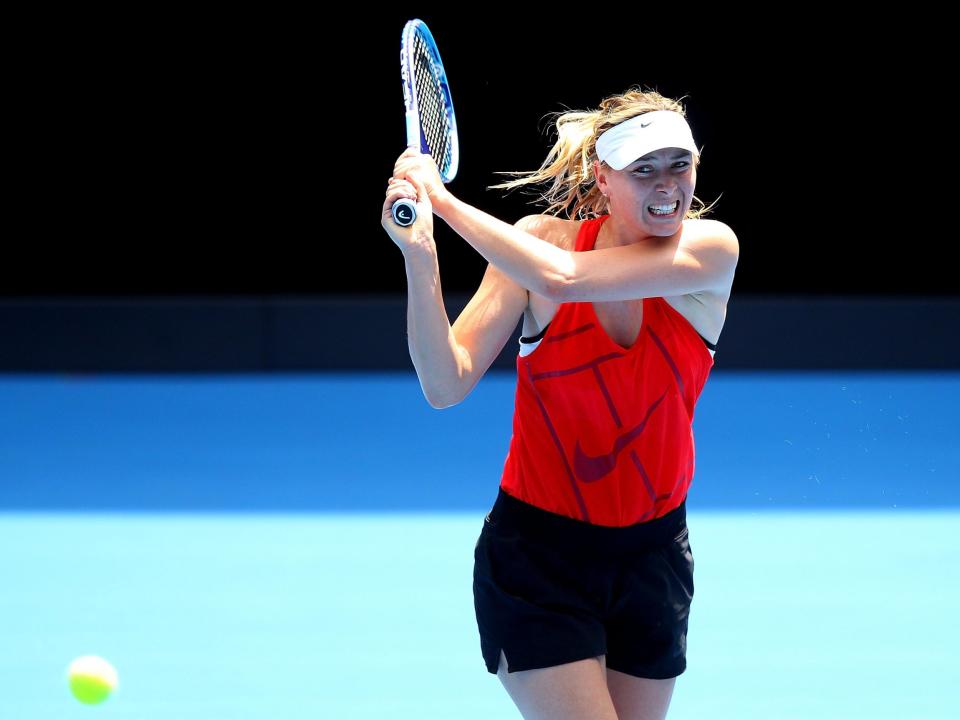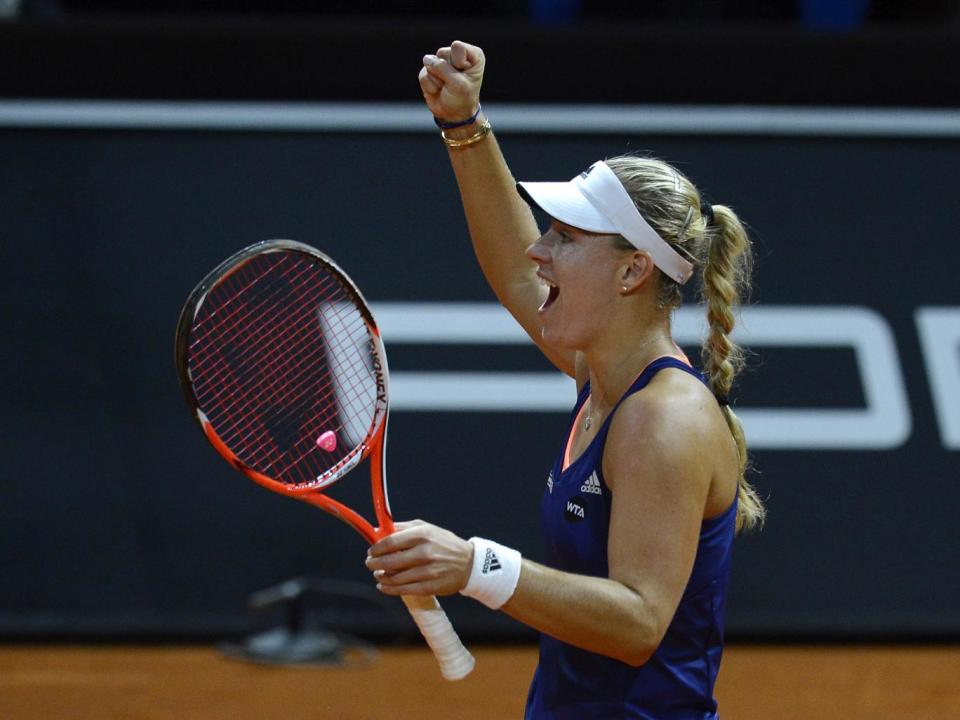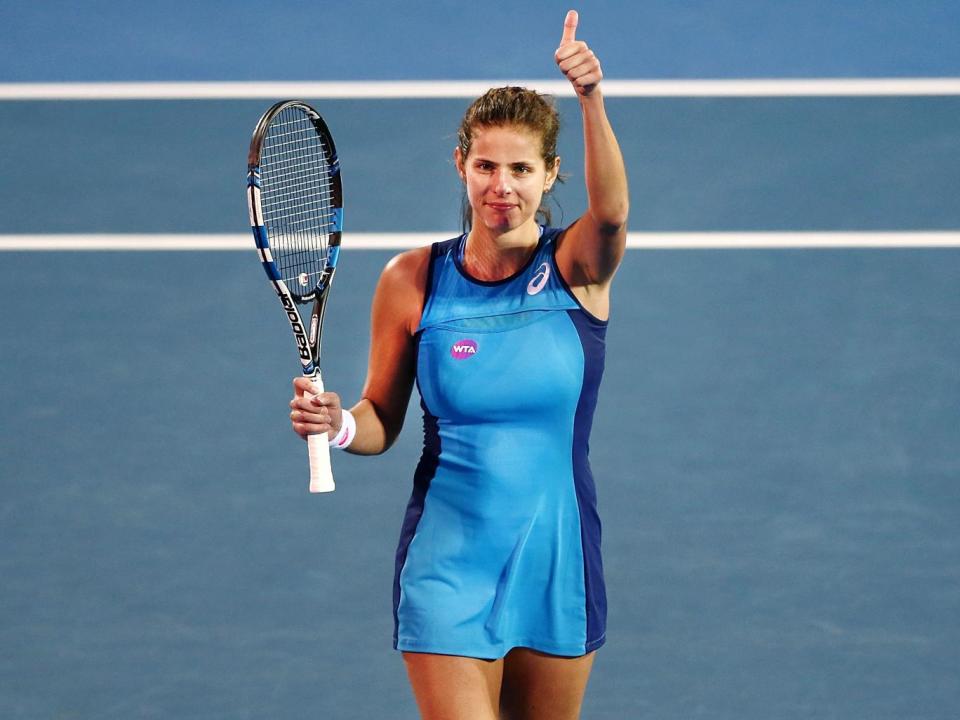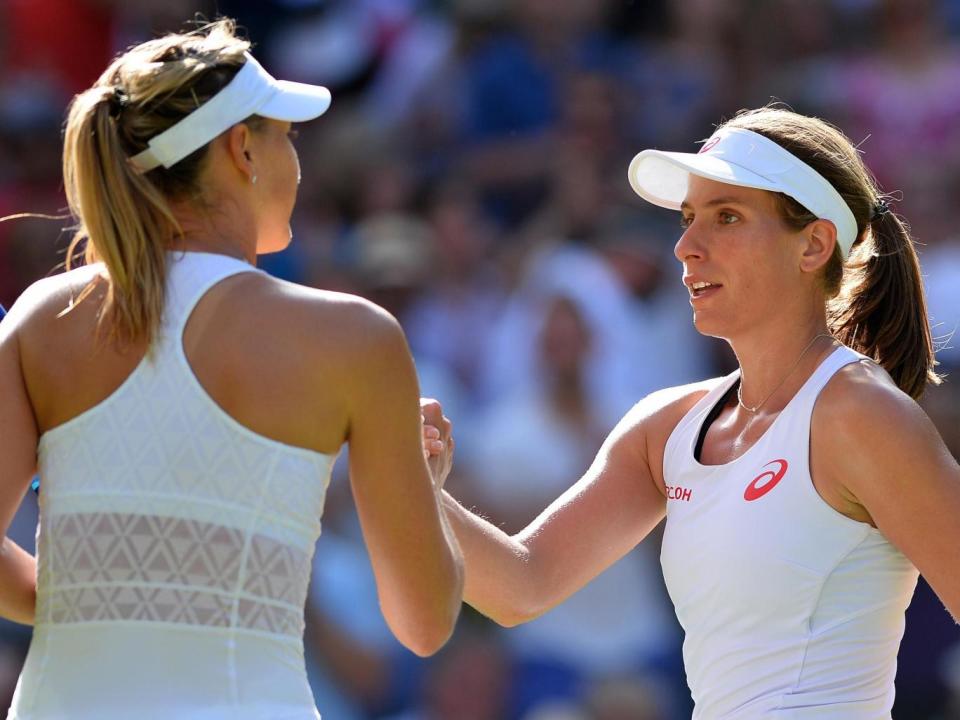Maria Sharapova wild card return at Porsche Grand Prix provokes yet more debate on the eve of her comeback

Maria Sharapova once told The Independent that she preferred not to spend too much time in the locker room. “It’s my least favourite place in the world,” she said. “I do my job at the site. I play my matches. I do what I have to do and I prefer to live my life away from the site rather than talk tennis all day.”
Her opinion is unlikely to change this week as more players have joined the opposition to the manner of her return here at the Porsche Tennis Grand Prix courtesy of a wild card. Sharapova, whose 15-month suspension expires at midnight on Tuesday, plays her first match on Wednesday evening against Italy’s Roberta Vinci.
On the eve of her return some top players expressed their misgivings. Simona Halep, the world No 5, believes that the tournament’s award of a wild card to someone suspended for a doping offence is a bad example to set to young players.
Angelique Kerber, the world No 2, would prefer that it had been given to a German player and Britain’s Johanna Konta believes the Women’s Tennis Association needs to clarify its rule book on the whole issue of wild cards.
Suspended players are not allowed into tournament venues, which is why Sharapova has been practising since the end of last week at a private club in the Stuttgart suburbs. On Wednesday, however, just nine hours after her ban finishes, she will practise on centre court at the Porsche Arena ahead of her match against Vinci, which will start no earlier than 6.30pm local time.
Last month Halep said she had been in favour of Sharapova receiving a wild card, on the basis that the Russian is a former world No 1 and Grand Slam champion, but here she said she could not support the Stuttgart tournament’s decision. “In my opinion, for the kids, for the young players, it’s not OK to help with wild card players who have been banned for doping,” she said.

The two other wild cards have gone to Konta, who made a late request to play after pulling out of her first scheduled clay-court event at Charleston in the wake of her Miami Open triumph, and Germany’s Laura Siegemund, who lives locally and was runner-up in this tournament 12 months ago.
Kerber is disappointed that Sharapova’s wild card did not go to her fellow German, Julia Goerges, who is a former champion here and was the key figure in her country’s Fed Cup victory over Ukraine in this very stadium last weekend.
“If it was my decision I would want to give [the wild card] to her for sure because she played amazingly at the weekend and she cannot play here,” Kerber said.

The situation here with Sharapova has highlighted some grey areas in the Women’s Tennis Association’s rule book. There is no guidance on the issuing of wild cards to players returning from suspension and there has been nothing to stop the tournament including Sharapova in the field despite the fact that she was still banned at the start of the tournament.
Kerber acknowledged that everything had been done within the rules but said it would be important to discuss the issues in the weeks and months ahead. Asked if she would be raising the issue personally with the WTA, Kerber said she had done so already. “It's just like a conversation right now,” she said. “I think a lot of players are talking about this as well.”
Konta did not want to offer an opinion on Sharapova’s situation – “I’m not here to be anyone’s judge” – but agreed that it was “a rule book issue”. She added: “I think a situation like this has highlighted a lot of things that need clarity. I’m sure it’s something that will be looked at in time.”

Agnieszka Radwanska, the world No 8, who had been critical of the granting of wild cards to Sharapova, was asked what she made of a comment by Max Eisenbud, the Russian’s agent. Eisenbud told the American journalist, Ben Rothenberg, that “journeyman” players like Radwanska and Caroline Wozniacki did not want Sharapova at the French Open because the tournament would be their last chance to win a Grand Slam title. “Who is Max?” Radwanska said. “Who is this guy? That’s my comment.”
It would be wrong, nevertheless, to give the impression that Sharapova is without her supporters. Following Serena Williams’ announcement that she will not play again this year ahead of the birth of her first child in October, there is no doubt that the women’s game needs high-profile players like the 30-year-old Russian.
“From the tournament’s side I think it’s going to be a big plus,” Karolina Pliskova, the world No 3, said. “Obviously with Serena being out now I think tennis definitely needs a star like her. I don’t have anything against it.”
Steve Simon, the CEO of the WTA, was asked what impact he thought Sharapova would make on her return. “Maria is a star,” he said. “There’s going to be a big impact. You can see the excitement about Wednesday. There are people on all sides of the fence, but it’s a great story. We wish her success. She served her penalty and we look forward to having her back.”

As for the message sent out by giving wild cards to Sharapova - rather than to young or local players - Simon said: “I think it should be sending out [the message] that you need to be focusing on winning. I don’t feel that the suspension should wipe put an entire body of work. She served the suspension and now she is eligible to play.”
Kim Clijsters, who is here in a new role as a “legend ambassador” for the end-of-year WTA Finals, agreed. “I think she’s done her time,” Clijsters said. “She has done hard punishment. I was disappointed and surprised when the news came out, but I think she has done her punishment. She is restarting her career with zero ranking points and has to work her way back.”
Sharapova will play in Madrid and Rome next month thanks to further wild cards. She would need another to go straight into the main draw for the French Open, which starts at the end of next month, but could make the qualifying competition for Roland Garros by reaching the final here.
The French tennis federation will not announce its wild cards until the week beginning May 15, but the new president, Bernard Giudicelli, has already suggested it might be hypocritical to give one to Sharapova at the same time as stepping up the fight against doping.
Wimbledon is likely to take a close interest in the French Open’s decision, though Sharapova could save the All England Club from having to discuss whether to give her a wild card. With good performances here, in Madrid and in Rome, she could garner enough ranking points to go straight into the main draw at Wimbledon.

 Yahoo Sports
Yahoo Sports 